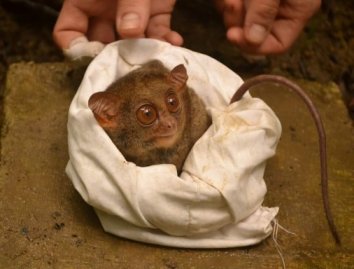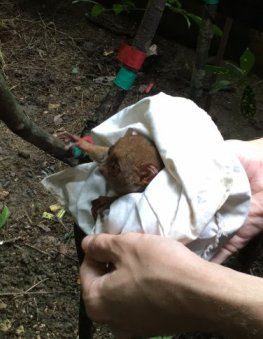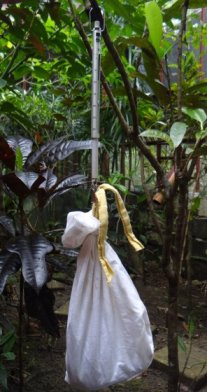PESOLA UNTERSTUETZT FORSCHUNGS- UND SCHUTZPROJEKT DER PHILIPPINEN KOBOLDMAKI
The Philippine tarsier (Tarsius syrichta) is one of the smallest primates in the world and inhabits only several islands in the Philippines. This species decreases in numbers due to habitat degradation, especially logging and illegal hunting. The latter is the biggest threat to tarsiers, because tarsiers are faunal symbol of the Philippines, especially of Bohol Island, and thus became a tourist spot. Local people try to meet the demand of growing tourist flow by establishment of tarsiers’ display facilities. Unfortunately, the Philippine tarsier is one of the animal species which is extremely difficult to keep in captivity. Despite attempts being made in the past in Western facilities, the breeding colony of this species has not been established. This is due to the lifestyle of the tarsiers which are nocturnal, stress prone and completely faunivorous, which means they eat only live animals, mostly insects. To provide necessary conditions for them in captivity is very difficult, so the Philippine tarsiers did not breed successfully.
The Tarsius Project: Research and Conservation of the Philippine tarsier (Tarsius syrichta) is located in Suabyon, Bilar, Bohol in the Philippines and tries to combat the extinction of these incredible creatures and secure its preservation through different activities, especially by conducting research, educating of local people, sustainable eco-tourism activities, implementation of livelihood projects for local villagers and welfare of captive tarsiers. The latter aims in establishment of captive breeding colony and development of husbandry guidelines, which could be used by local facilities, diminishing the need for replacement of captive tarsiers with the wild counterparts, if they breed.
The project’s activities were supported by PESOLA, which equipped the Tarsius Project with a Medio Line Spring Scale 40310 with dual reading 300g / 10oz. It has various use at the Project site and has proven to be an appropriate scales for the extremely humid areas such as Bohol Island.
The PESOLA scale has been used for weighing tarsiers at the Centre as well as their food. What is more, it has allowed the project staff to implement new method of weighing, which does not require catching of animals. It assumes that the tarsiers will jump on the branch attached to the Pesola scales and this structure is embedded and the hollow pole, so it can move up and down. Once the tarsiers are on the branch, which weight is known, the observer can read the weight of the tarsiers on the scales. It can tremendously decrease the stress associated with catching animals and still provide the important data on their weight and its monitoring.
“The Tarsius Project is extremely grateful to Pesola company for important contribution and support of our efforts in conservation of one of the most endangered primate species in the world, the Philippine tarsier”, says Filip J. Wojciechowski, Tarsius Project Manager.




